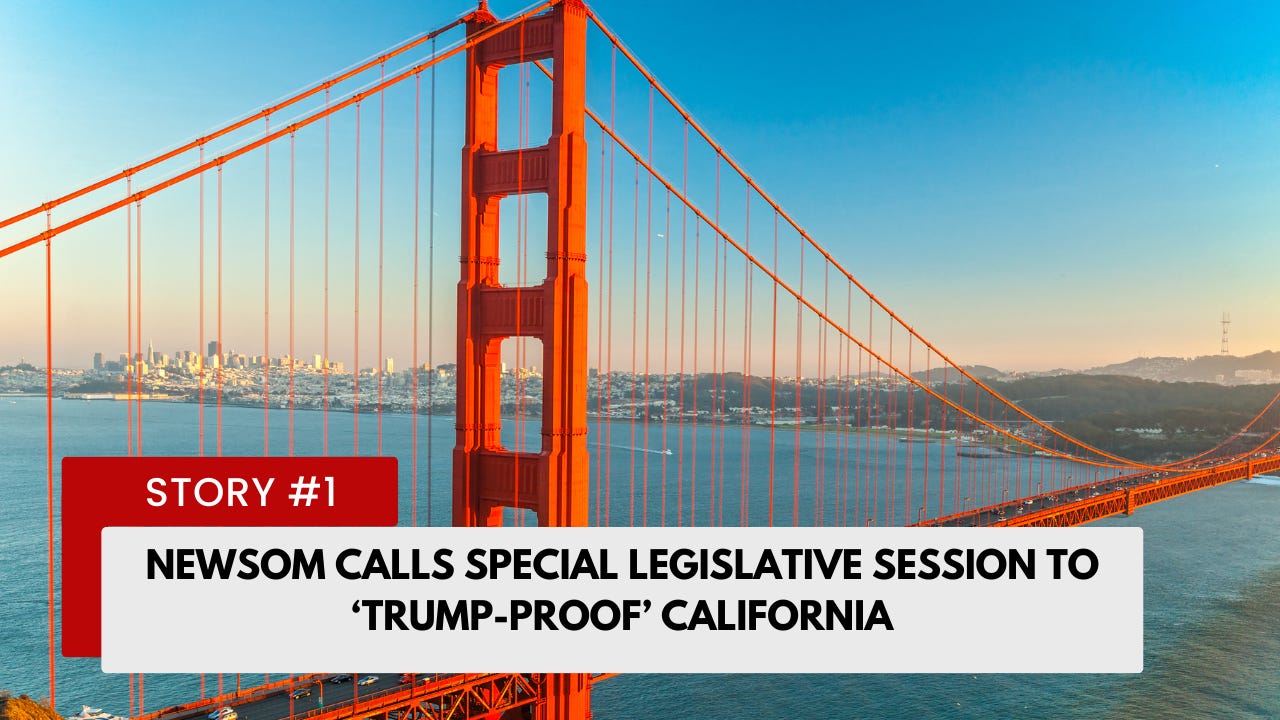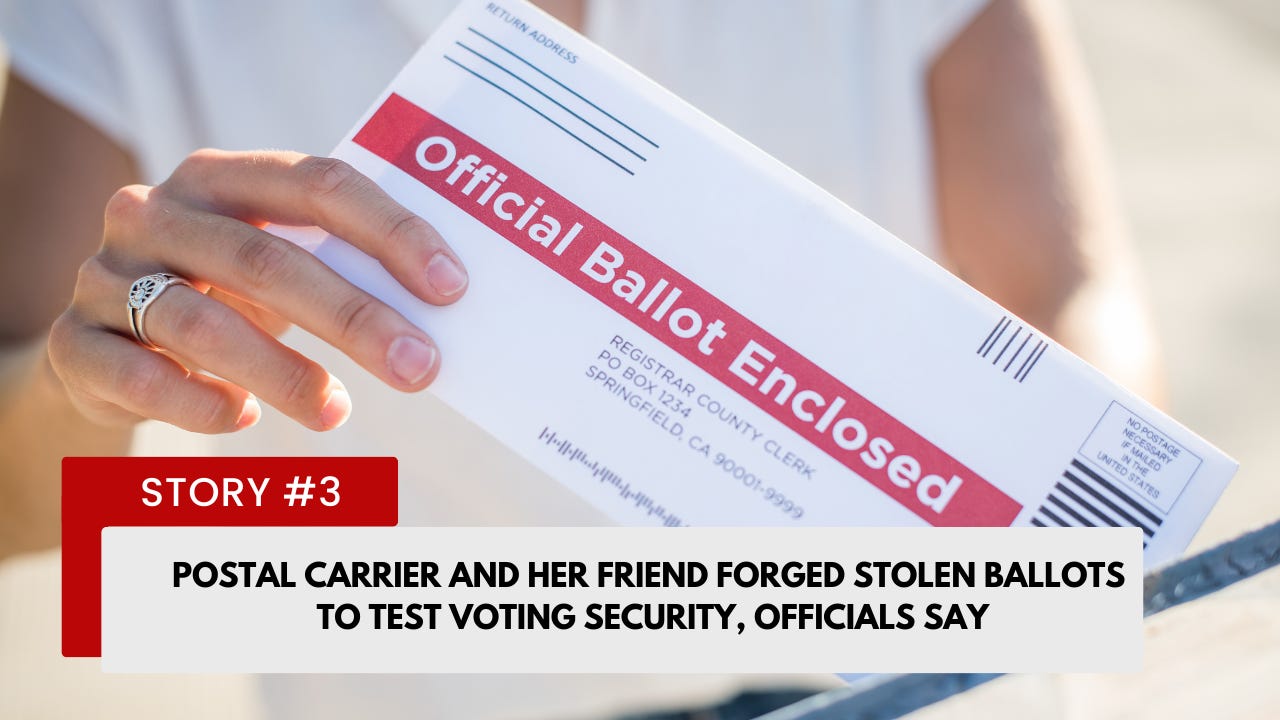I can't keep doing this independent journalism without all of you. Help me by becoming a paid subscriber for $5 a month. You can quit at anytime.

SACRAMENTO, CALIF - California Gov. Gavin Newsom (D) called a special session of the California legislature to “Trump-proof” the state against whatever the incoming federal administration intends to do — provoking a rebuke from the President-elect.
“I just called an emergency special session to help bolster our legal resources and protect our state against any unlawful actions by the incoming Trump Administration,” Newsom posted on X (formerly Twitter).
“Whether it be our fundamental civil rights, reproductive freedom, or climate action — we refuse to turn back the clock and allow our values and laws to be attacked.”
President-elect Trump responded on his social media platform, Truth Social, accusing Newsom of “using the term ‘Trump-Proof’ as a way of stopping all of the GREAT things that can be done to ‘Make California Great Again’.”
Newsom may try to become the leader of the so-called “resistance” to Trump — a glorified and controversial term for “opposition” — but it may prove more difficult for him, given that Trump won a popular majority, and nearly 40% of the vote in California itself.
Newsom clashed frequently with the first Trump administration, often over issues such as immigration, water, high-speed rail, and wildfires, though Trump provided emergency assistance to the state when needed. Click here to read more.

The FEMA supervisor who ordered relief workers to bypass the homes of Donald Trump’s supporters while administering hurricane aid in Florida has been fired following the Daily Wire report.
FEMA Administrator Deanne Criswell announced Saturday that supervisor Marn’i Washington had been fired after she ordered federal employees under her supervision to“avoid homes advertising Trump” as they canvassed Lake Placid, Florida to identify residents who could qualify for federal aid, according to messages shared with The Daily Wire by whistleblowers. These instructions were given both verbally and in writing, multiple government employees revealed.
“More than 22,000 FEMA employees every day adhere to FEMA’s core values and are dedicated to helping people before, during and after disasters, often sacrificing time with their own families to help disaster survivors. Recently, one FEMA employee departed from these values to advise her survivor assistance team to not go to homes with yard signs supporting President-elect Trump,” Criswell said in a statement. “This is a clear violation of FEMA’s core values and principles to help people regardless of their political affiliation. This was reprehensible.” Click here to read more.

GRAND JUNCTION, Colo. (KKCO/Gray News) - Two women now jailed in Colorado are accused of stealing ballots, altering them and then fraudulently submitting them for counting.
Fifty-nine-year-old Sally Jane Smith and a 64-year-old mail carrier, Vicki Lyn Stuart, are both charged with identity theft, attempting to influence a public servant and forgery for their involvement in an alleged scheme to “‘test’ the voting signature system for ballots utilized at elections,” according to the arrest affidavit.
Their goal, according to the affidavit, was to see if the forged signatures would be caught by the verification process.
Documents state that voters are still being tracked down and confirmed, but there may be 20 or more victims of the alleged scheme.
The two suspects were tracked down due to the fact that several of the ballots that were allegedly forged fell along the same mail delivery route; it was a route that was confirmed to be temporarily assigned to Stuart, the mail carrier.
Documents also stated that Stuart was interviewed by District Attorney Senior Investigator Rob Heil. He said Stuart was the person who allegedly delivered the ballots on that route.
Investigators also found that Stuart‘s GPS location showed her at the known victims’ houses on Oct. 12, the day when the affected ballots were supposed to be delivered.
Smith’s fingerprints were also allegedly found on a ballot by the Colorado Bureau of Investigation; it was a ballot she would not normally have access to as investigators found she was never an employee of the United States Postal Service or Mesa County Elections Department.
Arrest documents state that, eventually, law enforcement contacted Smith at her home. Click here to read more.

WASHINGTON D.C. - Every year on Veterans Day, communities nationwide unite to honor all who served or are still serving in the military. From parades and ceremonies to special events, the day honors veterans' contributions to our country and shows appreciation for their sacrifices. It is also a time to reflect on the challenges veterans can face when returning home or transitioning into civilian life.
While the textbook meaning of Veterans Day provides a general understanding of what it is and why we celebrate, the individual perspectives of veterans capture the day's essence. Each veteran Wounded Warrior Project® (WWP) serves has unique experiences that shape what Veterans Day means to them.
Veterans Day was initially known as Armistice Day and celebrated the end of World War I. The armistice, or call for peace, by the Germans was signed on Nov. 11, 1918, at the “eleventh hour” and ended the fighting between Allied forces and Germany. President Woodrow Wilson established Armistice Day one year later to honor those who served in WWI and celebrate the peace that followed.
After World War II and the Korean War, veterans service organizations urged the U.S. Congress to amend the holiday to be more inclusive of all veterans. Thus, Veterans Day was officially born in 1954 to honor American veterans, past and present. President Dwight D. Eisenhower was responsible for formally changing the name. Click here to read more.

WASHINGTON D.C. - In the final days of President-elect Donald Trump's 2024 campaign, he honed in on a culture war issue that may have locked in more swing votes and with it the election, a conservative activist instrumental in the ad campaign argues.
"Kamala is for they/them, President Trump is for you," the narrator of Trump's advertisement said.
The ad, which focused on men in women's sports and Vice President Kamala Harris' track record of ushering in sex change procedures for incarcerated people in California, was in part due to the influence of American Principles Project's president, Terry Schilling, who began pushing out these ads in 2019. Click here to read more.




















